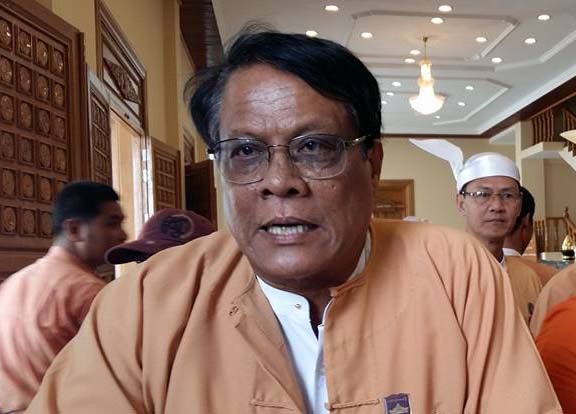More than 23,000 chickens have been culled in northern Burma’s Sagaing Division since the start of an outbreak of a deadly strain of avian bird flu there late last month. Although no human infections have been reported so far, around 500 chickens have died of the disease in poultry farms in Monywa Township, raising fears of health risks to the general population and further devastation to an important local industry.
DVB spoke to Sagaing Region’s Chief Minister Dr. Myint Naing earlier this week to learn more about his government’s handling of the crisis.
Question: What is the latest situation in Monywa, and how you are working to prevent the spread of the disease?
Answer: I went there [on Sunday] myself to discuss the situation with everyone, including people from the health and veterinary departments. Actually, we freed fish [to make merit] in the morning of New Year’s Day and ordered the killing of chickens in the evening. The chicken farms are divided into four groups — A, B, C and D. The flu had spread among the farms in the C group, so we had to examine the chickens in these farms. Yesterday, we found that chickens had tested positive in four farms out of six. We ordered a cull of all the chickens at the farms where chickens had tested positive. The others are under watch.
Q: This new strain is H9N2, not H5N1, the strain that hit Sagaing last year. What is the difference between the two strains? How dangerous is H9N2?
A: We know that the H5N1 and H5N2 strains are strong, but H9N2 is not so strong. It doesn’t spread as easily as previous strains. It can spread to people, but it’s not as strong as H5N1.
Q: How many chickens have died from the disease so far, and how many will need to be killed?
A: There were 420 chickens dead from 31 March to 14 April. When we checked yesterday [Sunday], we found another 25 had died. So there were about 450 dead [as of 18 April]. We asked people to do a good job of burying them. We put guards around the chicken farms so that nobody could take any of the chickens out, because we were worried that some farmers might sell the dead chickens. We culled more chickens yesterday, bringing the total to more than 15,000. We are still checking the situation with other chickens.
Yesterday, we asked the owners of the farms to sign a promise to inform us if they find any more chickens dead. This morning some farms were inspected. Wherever we find chickens that test positive, we cull them all and bury them. We urge people to dig deep pits for this purpose. I went around some of the affected farms to see the situation for myself.
Q: How far will you need to go in cleaning up the Monywa Chicken Breeding Zone?
A: We’re not sure yet. We can’t spare any farm where chickens have tested positive. I told the farm owners that. Some chickens are 11 or 12 months old. They lay eggs for about seven months. So we explained to them that if the flu spreads and you don’t kill the chickens, they will die by themselves anyway. There is no vaccine. So they need to bury the chickens so that the disease doesn’t spread to other farms. They should not keep them. It would not be good to have to kill all of the chickens at all of the farms.
I asked them to inform us if any of their chickens die, because then we need to check the farm. I told them we would do this because it is important. We will apologize once or twice, but if they don’t allow [us to inspect the farm], we will take action in accordance with the law. If this got out of control and spread to humans, it would be problem. We are working hard on this.
Q: Will the government compensate the farm owners for the loss of their chickens?
A: We will make a list [of losses] and send it to the Union government. We told them we will compensate them as much as we can. There are 250 chicken farms and 133 owners. The number of chickens is more than 120,000. So far we have killed nearly 20,000, and maybe today that number will reach 30,000. This morning we are checking four farms, and we will check more.
Q: What is your government doing to prevent people from buying diseased chickens?
A: We are telling people not to eat chickens or eggs. There are chickens coming in from other sources, but today I ordered a ban on selling chicken, [even] chickens coming from outside sources. So I think we are managing the situation.
Q: Have there been any cases of avian flu anywhere else?
A: We haven’t heard of any cases in other areas. In Monywa, we are asking people to keep a look out for dead chickens or birds. The health department has opened a clinic and is watching for cases of transmission to humans. So far, we haven’t seen any human infections.
Q: Is there anything you would like to tell people about this disease?
A: As this virus can mutate into another, more dangerous strain, we want to tell people that we are doing everything we can to clean up the situation as much as possible. And I want to tell people to avoid eating chicken or eggs as much as possible.



